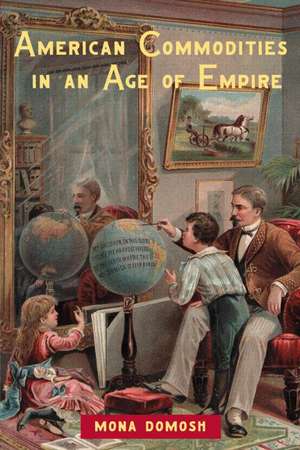American Commodities in an Age of Empire
Autor Mona Domoshen Limba Engleză Paperback – 19 iun 2006
| Toate formatele și edițiile | Preț | Express |
|---|---|---|
| Paperback (1) | 295.00 lei 6-8 săpt. | |
| Taylor & Francis – 19 iun 2006 | 295.00 lei 6-8 săpt. | |
| Hardback (1) | 1109.99 lei 6-8 săpt. | |
| Taylor & Francis – 19 iun 2006 | 1109.99 lei 6-8 săpt. |
Preț: 295.00 lei
Nou
Puncte Express: 443
Preț estimativ în valută:
56.45€ • 61.30$ • 47.42£
56.45€ • 61.30$ • 47.42£
Carte tipărită la comandă
Livrare economică 22 aprilie-06 mai
Preluare comenzi: 021 569.72.76
Specificații
ISBN-13: 9780415945721
ISBN-10: 0415945720
Pagini: 216
Ilustrații: 4 tables and 83 halftones
Dimensiuni: 152 x 229 x 13 mm
Greutate: 0.7 kg
Ediția:1
Editura: Taylor & Francis
Colecția Routledge
Locul publicării:Oxford, United Kingdom
ISBN-10: 0415945720
Pagini: 216
Ilustrații: 4 tables and 83 halftones
Dimensiuni: 152 x 229 x 13 mm
Greutate: 0.7 kg
Ediția:1
Editura: Taylor & Francis
Colecția Routledge
Locul publicării:Oxford, United Kingdom
Cuprins
1. Selling Civilization 2. The Geographies of Commercial Empire 3. The 'Great Civilizer' and Equalizer: Gender, Race, and Civilization in Singer Advertising 4. Manliness and McCormick: Frontier Narratives in Foreign Lands 5. Holidays with Heinz: Stories of Purity and Pickles in Foreign Lands 6. Commodities 'r Us Racism
Notă biografică
Mona Domosh is Professor of Geography at Dartmouth College. She is also co-editor of the journal Cultural Geographies
Recenzii
"The publication of American Commodities in an Age of Empire is a welcome addition to the scholarship of late-nineteenth-century commodity cultures. It provides a convincing demonstration of the historical complexity of even the humblest of everyday objects. Domosh’s modifications of our conventional understanding of American narratives of progress, civilization, gender, and race are sophisticated and provocative. The visual materials that she presents are a significant new resource for the intended specialized audience...recommended for all scholars interested in the relationship between factory-made consumer goods, late Victorian-era cultural ideals, and US commercial imperialism." -- Interiors
Descriere
This is a novel interpretation of the relationship between consumerism, commercialism, and imperialism during the first empire building era of America in the late 19th and early 20th centuries. Unlike other empires in history, which were typically built on military power, the first American empire was primarily a commercial one, dedicated to pushing products overseas and dominating foreign markets. While the American government was important, it was the great capitalist firms of America-- Heinz, Singer, McCormick, Kodak, Standard Oil--that drove the imperial process, explicitly linking the purchase of consumer goods overseas with "civilization." Their persistent message to America's prospective customers was, "buy American products and join the march of progress." Domosh also explores how the images of peoples overseas conveyed through goods elevated America's sense of itself in the world.









